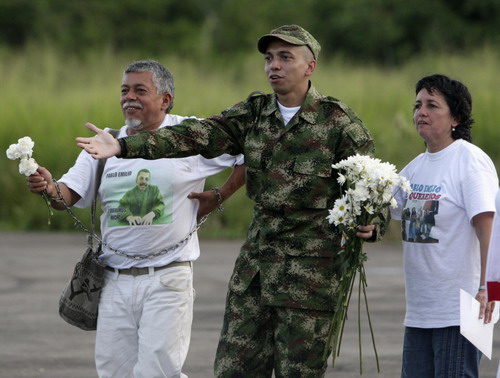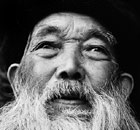Global General
Colombia rebels free hostage after 12 years
(Agencies)
Updated: 2010-03-31 11:10
 |
Large Medium Small |
FLORENCIA, Colombia - Colombian rebels on Tuesday freed a government soldier who was held hostage in the jungle for more than 12 years and symbolized those left behind in a war against Latin America's oldest insurgency.
|
 Colombian soldier Pablo Emilio Moncayo (C) stands with his father Gustavo Moncayo and mother Stella after his arrival in Florencia March 30, 2010. Colombian rebels on Tuesday freed a hostage soldier they had held in secret camps for more than 12 years after guerrillas overran his army base at the height of the conflict, the Red Cross said. A Red Cross mission flew into the southern jungles and was returning with Moncayo, 32, who was a teenager when captured and become a symbol of those left behind in the waning war against Latin America's longest-running insurgency. [Agencies]
|
A Brazilian military helicopter ferried Sergeant Pablo Emilio Moncayo to a civilian airport in Florencia, 370 km (230 miles) south of the capital Bogota, after rebels handed him over to a Red Cross team in Colombia's remote southern jungle.
Moncayo smiled and looked well as he stepped off a helicopter in uniform to greet family on the airport tarmac.
"I thank God and my father," Moncayo told reporters. "You have no idea how staggering it is to return to civilization."
Now 32, Moncayo was a teenager when he was captured by guerrillas who overran his army communications base in 1997 and marched him into the jungle. He was seen only occasionally in rebel videos during his captivity.
Guerrillas on Sunday freed Josue Daniel Calvo, kidnapped a year ago after he was wounded in combat. But they still hold 22 police and soldiers in secret camps, where they are often chained, starving and forced to run from army patrols.
Moncayo's father lobbied for his release with from Venezuela to France, often wearing chains to symbolize his son's captivity.
The handovers came before Colombians go to the polls in May to pick a successor for the conservative Uribe. He steps down after two terms dominated by his hard-line against the FARC, or Revolutionary Armed Forces of Colombia.
But any candidate to replace him will likely maintain his popular tough security and pro-business policies.
HOPE FOR HOSTAGES
The releases have reopened discussions about a possible broader agreement to negotiate an exchange of jailed rebels for kidnapped troops. But past unilateral hostage releases have not led to any such agreement or opened up peace talks.
Uribe, whose father was killed in a botched rebel kidnap bid two decades ago, says he is open to an exchange if freed rebels do not return to crime and if the handover does not mean demilitarizing an area that would allow rebels to regroup.
The FARC has demanded Uribe pull troops back from a zone the size of New York City to guarantee any handover, but appear to have dropped that condition. They also want to include several extradited FARC leaders held in US jails in a swap.
"With this unilateral gesture, the FARC believes the road is open for an exchange of prisoners as the only way ... to return prisoners in the jungles as well as guerrillas in jails in Colombia and the United States," it said in a statement.
Once an army that bombed and kidnapped at will, the FARC has lost top commanders and seen its ranks thinned by desertions. Violence and bombings have dropped sharply. But it is still a threat in rural areas where state presence is weak, thanks to cash from cocaine trafficking.
Earlier, Venezuela's state-backed Telesur television showed images of Moncayo with Piedad Cordoba, a Colombian senator who traveled with the Red Cross and has negotiated with rebels.
The Colombian government demanded Telesur explain how it managed to have broadcasts from the handover site, which was meant to be confidential. Telesur said it had been sent the images by e-mail as had other channels.
Hugo Chavez, Venezuela's socialist president, has in the past negotiated with the FARC to free hostages. But Colombian officials say FARC rebels take refuge in the neighboring country, and the two governments are currently locked in a diplomatic dispute.










